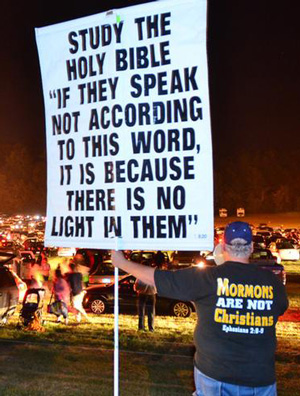Somehow, through the centuries and millennia of history, religious folk have gotten the notion that the supreme goal of their spiritual pursuit is to know the right answer—to find and know the Truth. With a capital ‘T’. Certainly a goal of spiritual hunger is to find answers, enlightenment, and ‘truth’. But just what that means—”What…
Life With God
Our Experience at the Hill Cumorah Pageant
“You’re all sinners! You are an abomination to God!!” These words were angrily spit at the thousands of people peacefully passing through the entrance to the Hill Cumorah Pageant’s last showing for 2013—an event which was attended by this writer and his wife. Friends of ours participated in the Pageant this year. They played various…
¿Saber, o Conocer? [Church Book Excerpt]
Several years ago I published a book containing much of the writing on the topic of the Church that I had published here up to that point. Those posts are still available in the archives, and many are still read on a weekly basis. Just the other day I was flipping through a copy of…
The Year of Jubilee
I had a run-in with the law this week. Well, it was not specifically I who did, and, it was more of a “walk-in” as opposed to a “run-in”. But that statement was generally true. If you are a regular reader of this website, you are aware that our oldest son is running a lemonade…
Bee-Do, Bee-Do
“You’re a human being, not a human doing!” Perhaps you’ve heard, or read that somewhere? I have. It’s clever, and correct—albeit somewhat cliche. A quick search of the web will confirm its ubiquitous usage.1 The reason for such widespread repeating? We tend to focus on the things we do, more than the things we are….
No Strings Attached
This was originally posted April 19th, 2010. It could easily have been posted in 2013, so I am re-posting it today. It continues the theme of how we interact, how we relate. Speaking of which … off to the next visit! 🙂 I just need to get something off my chest. I’ve been thinking about…
[From The Archive] Relating
Our recent visit to Ohio for some big family events has given us the opportunity for some great visiting time with relatives and friends we haven’t seen for a long while—some a very long while! Those visits often include shared meals, certainly include sharing stories, and have also included some great conversations about the things…
Full of Life
Recently, I was fascinated by poop. (Yes, you read that correctly.) Actually, it started in a public outhouse-style “restroom”. If you’ve never used an outhouse, or a “port-a-potty”, it’s just a big container collecting all the liquid and solid waste, rather than flushing it away down a nice, convenient pipe—out of sight, out of mind….
An Open Letter Apology from the Church
Not that I have any real force behind this open letter to every person on the planet, but it’s what’s on my heart today. For so long, those who claim to know and live for God have been such a harmful representation of him (myself included) that many people wrongly dismiss their rightful place as…
DOMA Arigato
Just about a week ago, the Supreme Court of the United States (SCOTUS) was in the news for two rulings in regards to same-sex marriages. One was specific to California (Proposition 8), and I won’t address that here, but the first was regarding a case challenging the constitutionality of section three (§3) of the Defense…

